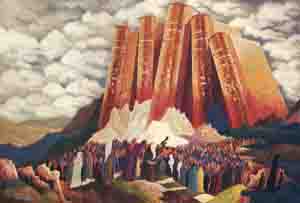Thursday, May 25, 2006
A Movie For Memorial Day, to Support Our Troops
Click on link or cut and past link into your Address bar and hit go.
http://www.thetrenchmovie.com/
Wednesday, May 24, 2006
The Story Of Shavuot-The revelation at Sinai
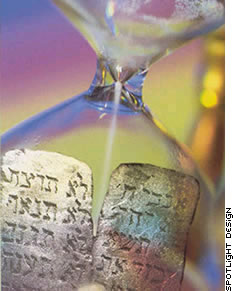
On the first of Sivan, the first day of the third month after the exodus from Egypt, the children of Israel reached the desert of Sinai and camped near the mountain.
During the few weeks of traveling in the desert under Divine protection, with daily miracles, such as the manna and the quail, the miraculous sweetening of the water, the defeat of Amalek, and the crossing of the Red Sea, the Jewish people had become more and more conscious of G-d.
Their faith grew more intense daily, until they attained a standard of holiness, solidarity and unity, never achieved before or after by any other nation. Moses ascended Mount Sinai, and G-d spoke to him the following words: "Thus shalt thou say to the house of Jacob, and tell the children of Israel: 'Ye have seen what I did unto the Egyptians, and how I bore you on eagles' wings, and brought you unto Myself. Now, therefore, if ye will hearken unto My voice indeed, and keep My covenant, then ye shall be Mine own treasure from among all peoples; for all the earth is Mine; and ye shall be unto Me a kingdom of priests, and a holy nation.'" Moses returned from Sinai and called for the elders of the people and put all these words of G-d before them. Unanimously, with one voice and one mind, the people answered: Naaseh Venishma, "Everything G-d has said, we shall do."
Thus they accepted the Torah outright, with all its precepts, not even asking for a detailed enumeration of the obligations and duties it involved.When Israel had voiced its eagerness to receive the Torah, G-d spoke to Moses again: "Go unto the people, and sanctify them today and tomorrow, and let them wash their garments, and be ready against the third day; for on the third day the L-rd will come down in the sight of all the people upon Mount Sinai. And thou shalt set bounds unto the people round about saying: Take heed to yourselves, that ye go not up onto the Mount, or touch the border of it; whatsoever toucheth the Mount shall surely die."
The Revelation at Sinai
The dawn of the third day broke amid thunder and lightning that filled the air. Heavy clouds hung over the mountain, and the steadily growing sounds of the Shofar made the people shake and tremble with fear. Moses led the children of Israel out of the camp and placed them at the foot of Mount Sinai, which was all covered by smoke and was quaking, for G-d had descended upon it in fire. The sound of the Shofar grew louder, but suddenly all sounds ceased, and an absolute silence ensued; and then G-d proclaimed the Ten Commandments as follows: 1. "I am the Lord thy G-d, Who brought thee out of the land of Egypt, out of the house of bondage. 2. "Thou shalt have no other gods before Me. Thou shalt not make unto thee a graven image, nor any manner of likeness, of any thing that is in heaven above, or that is in the earth beneath, or that is in the water under the earth; thou shalt not bow down unto them, nor serve them; for I the Lord thy G-d am a jealous G-d, visiting the iniquity of the fathers upon the children of the third and fourth generation of them that hate Me; and showing mercy unto the thousandth generation of them that love Me and keep My commandments. 3. "Thou shalt not take the name of the Lord thy G-d in vain; for the Lord will not hold him guiltless that taketh His name in vain. 4. "Remember the Sabbath Day, to keep it holy. Six days shalt thou labor, and do all thy work; but the seventh day is a Sabbath unto the Lord thy G-d, in it thou shalt not do any manner of work, thou, nor thy son, nor thy daughter, nor thy man-servant, nor thy maid-servant, nor thy cattle, nor thy stranger that is within thy gates; for in six days the Lord made heaven and earth, the sea and all that in them is, and rested on the seventh day; wherefore the Lord blessed the Sabbath Day, and hallowed it. 5. "Honor thy father and thy mother, that thy days may be long upon the land which the Lord thy G-d giveth thee. 6. "Thou shalt not murder. 7. "Thou shalt not commit adultery. 8. "Thou shalt not steal. 9. "Thou shalt not bear false witness against thy neighbor. 10. "Thou shalt not covet thy neighbor's house; thou shalt not covet thy neighbor's wife, nor his manservant, nor his maid-servant, nor his ox, nor his ass, nor anything that is thy neighbor's
Moses Receives the Torah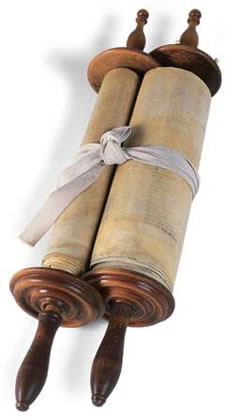
The entire people heard the words of G-d, and they became frightened. They begged Moses to be the intermediary between G-d and them, for if G-d Himself would continue to give them the entire Torah, they would surely die. Moses told them not to be afraid, for G-d had revealed Himself to them so that they would fear Him and not sin. Then G-d asked Moses to ascend the mountain; for he alone was able to stand in the presence of G-d. There Moses was to receive the two tablets containing the Ten Commandments and the entire Torah, to teach it to the children of Israel.
Moses went up the mountain and stayed there forty days and forty nights, without food or sleep, for he had become like an angel. During this time, G-d revealed to Moses the entire Torah, with all its laws and the interpretations thereof.
Finally, G-d gave Moses the two stone Tables of Testimony, containing the Ten Commandments, written by G-d Himself.
Sunday, May 21, 2006
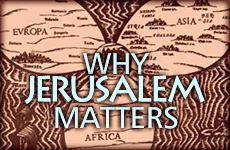
Through 2,000 years of exile, Jews from four corners of the world always turned in prayer toward Jerusalem. What memory were they so eager to preserve?
Jerusalem has no strategic signifigance. It has no commercial or industrial importance, and it is not a cultural center.
How has this ancient city, unimportant as it appears, crept to the heart of contention between Israel and the Palestinians over the future of the land of Israel? Why should we care what happens to Jerusalem?
We need to begin by understanding the importance of memory. Memory isn't history or dead memorabilia. By defining the past memory creates the present. Repression of memory creates mental disease. Health comes from memory's recovery. Dictators consolidate power by altering memory. Stalin airbrushed Trotsky and Bukharin out of photographs. Revisionists deny the Holocaust ever happened. Why does it matter?
In Hebrew, the word for man is "zachar." The word for memory is "zecher." Man is memory. People who suffer memory loss through illness or accident don't just misplace their keys. They lose their selves. They become lost and adrift in time, because without memory, the current moment has no context, and no meaning.
When the Jews were first exiled from Jerusalem, King David said, "If I forget you Jerusalem, let my right hand lose its strength. Let my tongue cling to my palate if I fail to recall you, if I fail to elevate Jerusalem above my highest joy." The memory of Jerusalem somehow is linked to our current vigor as a people. But how? What is the memory of Jerusalem, and what does it contribute to who we are?
The memory of Jerusalem somehow is linked to our current vigor as a people
London comes from a Celtic word which means "a wild and wooded town." Cairo is an anglicized version of the Arab name for Mars, the Roman god of war. Paris is named for the Paris of Greek myth, who was asked by the gods to choose between love, wisdom, and power. He chose love - the love of Helen of Troy.
The Talmud says Jerusalem was named by God. The name has two parts: Yira, which means "to see," and shalem, which means "peace."
Jerusalem was the place of Abraham's sacrifice of Isaac, and Abraham said of Jerusalem, "This is the place where God is seen."
Elsewhere, God is a theory, but in Jerusalem, God is seen, and felt, as a tangible presence. In Jerusalem we reach beyond the frailty and vulnerability of our lives, and we sense and strive for transcendence. Elsewhere we grope for insight. In Jerusalem we anticipate clarity. Paris may be for lovers, but Jerusalem is for visionaries.
In Jerusalem, God is seen, and felt, as a tangible presence.
Jerusalem is a metaphor for a perfected world, and it gives us perspective on our lives. When Aldous Huxley said, "we have each of us our Jerusalem," he meant much more than a temporal city of taxi cabs and traffic jams. He meant a vision of what life might be.
The vision of life's promise is one we surrender at our peril, because it gives us the will to live. In exile for two thousand years Jews said "Next year in Jerusalem," and amidst poverty and oppression they preserved the dream of a world in which love and justice, not power and self-interest, would be the currency men live by.
Part of the name Jerusalem is "vision." The other part of the name is peace, but the peace of Jerusalem is not the absence of strife. Jerusalem has rarely known anything but strife. The peace of Jerusalem is the peace at the center of the spokes of a wheel, where opposing forces may be delicately balanced and reconciled.
The Talmud says that creation began in Jerusalem, and the world radiated outward from this place. Medieval maps show Jerusalem at the epicenter of Asia, Europe, and Africa. The world flows into this spot, and all life's forces resonate here. From this place, the whole world is cast into perspective.
Jerusalem, the center, which gives perspective to the rest of the world. Jerusalem where God is seen. Jerusalem the perfected world. Humanity has long understood that he who controls Jerusalem controls the world's memory. He controls the way God is seen. He controls the way life's forces are cast into perspective. He controls the way we collectively see our future.
Once the Temple Mount was the highest point in the city of Jerusalem, but in the year 135, Roman slaves carried away the dirt of the mountain, and turned it into the valley we now look down on from the Old City. The Romans expelled Jews from Jerusalem and barred them from reentering on pain of death. Jewish life, they proclaimed, has now ended.
The Crusaders rewrote Jerusalem's importance, the center no longer of Jewish national drama, but the site of the passion and death of Jesus. Like the Romans they expelled Jews, and destroyed synagogues.
The Moslems came after, and as those before them rewrote the memory of Jerusalem, expelling Jews and Christian. They systematically built mosques on every Jewish holy site. They airbrushed the past.
In rewriting the history of Jerusalem each of these cultures rewrote our place, the Jewish place, in history. They consigned us, they believed, to the dust bin of history -- a once great people, now abandoned by God; bypassed by time.
In rewriting the history of Jerusalem each of these cultures rewrote our place, the Jewish place, in history.
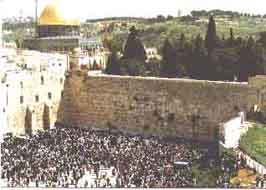
But Jews preserved Jerusalem as a memory. When we built our houses we left a square unplastered, and we broke a glass at weddings in memory of Jerusalem. From all over the world we turned and prayed toward Jerusalem, and because memory was kept alive, the Jewish people lived.
When Jerusalem was liberated, time was conflated. The past became present. What we had longed for became ours. What we had dreamed of became real, and soldiers wept because an adolescent Mediterranean country suddenly recovered a memory lost for 2000 years. The past was instantly present, incredibly, transcendently, transforming who we knew ourselves to be.
Who are we? We are not despised and impoverished itinerants, surviving on the fickle goodwill of other nations. We are not a nation of farmers recovering swamps, nor of warriors - though when we need to be we are all these things.
We are a nation of priests and of prophets, a light unto mankind. We taught the world "to beat their swords into plowshares," "to love your neighbor as yourself," equality before justice, and that admiration belongs not to the rich and powerful, but to the good, the wise, and the kind. Hitler said, "The Jews have inflicted two wounds on humanity: Circumcision on the body and conscience on the soul." How right he was and how much more we have to do. How tragic when we fail ourselves.
Already divided by language, by geography, and even by religion, our people is bound only by threads of memory and of hope. These threads are exquisitely fragile. If they sever we will fragment, and the long and bitter exile of our people - not yet fully ended, is consequence, says the Talmud, of the dissentions which sunder us from one another.
To this threat, Jerusalem provides counterpoint, for Jerusalem embodies our memories and hopes. Jerusalem is a living memory, a vision of God in our lives, an image of a perfected world. Jerusalem gives us the strength to achieve what we as a people must do, to unite ourselves, and to sanctify this world. This is why Jerusalem matters.
Published: Wednesday, October 04, 2000
By Rabbi Nachum Braverman
Friday, May 19, 2006
A Marine's Story
Last week, while traveling to Chicago on business, I noticed a Marine sergeant traveling with a folded flag, but did not put two and two together. After we'd boarded our flight, I turned to the sergeant, who'd been invited to sit in First Class (and was seated across from me), and inquired if he was heading home.
"No," he responded.
"Heading out?" I asked.
"No. I'm escorting a soldier home."
"Going to pick him up?"
"No. He is with me right now. He was killed in Iraq. I'm taking him home to his family."
The realization of what he had been asked to do hit me like a punch to the gut. It was an honor for him. He told me that, although he didn't know the soldier, he had delivered the news of his passing to the soldier's family and felt as if he did know them after so many conversations in so few days. I turned back to him, extended my hand, and said, "Thank you. Thank you for doing what you do so my family and I can do what we do."
Upon landing in Chicago the pilot stopped short of the gate and made the following announcement over the intercom.
"Ladies and gentlemen, I would like to note that we have had the honor of having Sergeant Steeley of theUnited States Marine Corps join us on this flight. He is escorting a fallen comrade back home to his family. I ask that you please remain in your seats when we open the forward door [so as to] allow Sergeant Steeley to deplane and receive his fellow soldier. We will then turn off the seat belt sign."
Without a sound, all went as requested. I noticed the sergeant saluting the casket as it was brought off the plane, and his action made me realize that I am proud to be an American. So here's a public thank-you to our military for doing what you do so we can live the way we do.
Stuart Margel, Washington, D.C.
Todd Heisler The Rocky Mountain News
When 2nd Lt. James Cathey's body arrived at the RenoAirport, Marines climbed into the cargo hold of the plane and draped the flag over his casket as passengers watched the family gather on the tarmac. During the arrival of another Marine's casket last year at DenverInternationalAirport, Major Steve Beck described the scene as one of the most powerful in the process: "See the people in the windows? They'll sit right there in the plane, watching those Marines. You gotta wonder what's going through their minds, knowing that they're on the plane that brought him home," he said. "They're going to remember being on that plane for the rest of their lives. They're going to remember bringing that Marine home. And they should."
Todd Heisler The Rocky Mountain News
The night before the burial of her husband's body, Katherine Cathey refused to leave the casket, asking to sleep next to his body for the last time. The Marines made a bed for her, tucking in the sheets below the flag. Before she fell asleep, she opened her laptop computer and played songs that reminded her of 'Cat,' and one of the Marines asked if she wanted them to continue standing watch as she slept. "I think it would be kind of nice if you kept doing it," she said. "I think that's what he would have wanted."
PLEASE KEEP THIS GOING!
Ann
FREEDOM isn't FREE
... someone pays for you
Harming others according to the Jewish religion
http://www.aish1.com/mp3/IAM/IAM_Behar_Shraga_2003.mp3
America according to John Wayne.
If you love America this is something you should see and keep for your computer or send it to as many people you know. Cut and paste link into your address bar
http://sagebrushpatriot.com/america.htm
Shavuot & The Magnificent 7
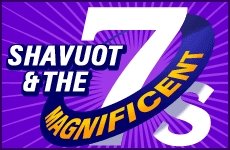
An incredible tapestry of 7's has been woven into the creation.
How many can you name?
In the beginning... God created 7's.
Oh sure, He created light and dark, the heavens and earth, too. But for reasons unknown to us, He seemed to have a special affinity for the number 7.
The fact that the Torah begins with a verse containing 7 words and 28 letters (divisible by 7) is hardly remarkable. But when placed within the context of the overwhelming number of associations in Judaism with '7', a fascinating tapestry begins to unfurl. Let's take a closer look at this phenomenon.
WHY "SHAVUOT?"
Every spring, Jews around the world celebrate the holiday of Shavuot --commemorating the most seminal event in the history of mankind, God's revelation at Mount Sinai.
Shavuot. Curious name for this holiday, no? Shavuot means "weeks," underscoring the 7-week period between Passover and Shavuot in which we count each day (and week) in anticipation and preparation for re-living the Sinai revelation. But why call it Shavuot -- "weeks"? Why not call the holiday "Torah," or "Sinai," or "Commandments," or "Tablets." Of what significance is "Weeks"?
Time contains many different entities. Nearly all of them are related to natural phenomena. Days, nights, months, seasons and years are all directly determined, in some way, by the constellations. There is one exception -- the week. The formulation of a week seems to be totally arbitrary. Who needs it? Let one day just follow the previous one. And why 7 days?
The concept of a week and its constitution of 7 days is one that is strictly God-invented and human-adopted. While we may quibble about creation -- how, when, by whom, why -- the world has consensually agreed to the concept of a week. The Beatles were wrong... there are only 7 days in a week. And whenever a week is completed it is yet another reminder to mankind (or should be) that God created the world in 7 days. (Only 6 days were required to manufacture the physical structures, but the process was not complete until the spiritual realm, Shabbat, was added.)
Call it the "week link."
WHY "7"?
Kabbalah teaches that 7 represents wholeness and completion. After 7 days, the world was complete. There are 6 directions in our world: north, south, east, west, up and down. Add to that the place where you are, and you have a total of 7 points of reference.
Shavuot, marking the emergence of the Jewish people into a nation, by virtue of their receiving and accepting the Torah, also marks a completion. Perhaps that is why the holiday is called Shavuot, "Weeks." We want to identify this holiday as a completion of the process of Jewish nationhood.
No one is certain why God chose the number "7" to signify completion. All we can do is speculate, observe and marvel.
In honor of our own completion of the 49 day period leading up to Shavuot, we present 49 allusions to the number "7" within Judaism. How many of these do you recognize? How many more can you add?
THE MAGNIFICENT SEVENS!
1. Shabbat is the 7th day of the week.
2. There are 7 weeks in the counting of the Omer before Shavuot. (Leviticus 23:15)
3. In Israel, there are 7 days of Passover and Sukkot. (Leviticus 23:6, 34)
4. Every 7th year, the land lays fallow during Shmita (Sabbatical year). (Leviticus 25:4)
5. After 7 cycles of Shmita, we have a Jubilee year (Yovel). (Leviticus 25:8)
6. When a close relative dies, we sit Shiva for 7 days.
7. On Sukkot we shake 7 species - 1 Lulav, 1 Esrog, 2 willows, and 3 myrtles.
8. Yitro, the first real convert to Judaism, had 7 different names, and 7 daughters (one who married Moses).
9. Moses was born and died on the same day - the 7th of Adar.
10. Our Sukkah huts are "visited" by 7 guests - Abraham, Isaac, Jacob, Moses, Aaron, Joseph and David.
11. The Menorah in the Temple had 7 branches.
12. Achashvarosh, King of Persia during the miracle of Purim, held a party for 7 days. (Esther 1:5)
13. There are 7 holidays in the Jewish year: Rosh Hashana, Yom Kippur, Sukkot, Chanukah, Purim, Passover, and Shavuot.
14. In addition to the 613 Commandments, the Sages added 7 more.
15. There are 7 Noachide Laws pertaining to all humanity.
16. At every Jewish wedding, 7 blessings are recited (Sheva Brachot).
17. Each Shabbat, 7 people are called to the Torah reading (Aliyot).
18. The first verse in the Torah contains 7 words (and 28 letters).
19. Our Matriarch Leah had 7 children - six sons and one daughter.
20. There were 7 days of preparation for the construction of the Tabernacle in the desert. (Leviticus 8:35)
21. Traditionally, the bride circles the groom 7 times under the Chuppah (wedding canopy).
22. We wind the Tefillin straps around the arm 7 times.
23. Moses was the 7th generation after Abraham.
24. Each plague in Egypt lasted 7 days.
25. In Pharaoh's dreams there were 7 cows and 7 stalks of grain. (Genesis 41)
26. The Biblical contamination period typically lasts 7 days. (Leviticus 13:4)
27. God created 7 levels of heaven. (Hence the expression, "I'm in 7th heaven!")
28. On Shabbat and holidays, we recite 7 blessings in the silent Amidah.
29. There are 7 special species of produce by which the Land of Israel is praised: wheat, barley, grapes, pomegranates, figs, olives, and dates. (Deut. 8:8)
30. The world has 7 continents.
31. The 7 weeks of the Omer correspond to the 7 "sefirot," the 7 behavior traits in which we serve God: kindness, strength, beauty, triumph, splendor, foundation, and kingship.
32. Noah sent the dove and the raven out of the Ark for 7 days to inspect the weather conditions. (Genesis 8:10)
33. 7 nations warred with Israel: Canaanites, Hittites, Hivites, Amorites, Perizzites, Jebusites, and Girgashites.
34. On Yom Kippur, the High Priest sprinkled the blood in the Temple 7 times. (Leviticus 16)
35. The Jewish New Year of Rosh Hashana occurs, surprisingly, in the 7th month -- Tishrei. (Leviticus 23:24)
36. The Jewish calendar, largely lunar, has a cycle of intercalation that contains 7 leap years during each 19-year period.
37. There are 7 notes on the musical scale.
38. A Kohen (priest) should participate in the burial of 7 relatives: father, mother, sister, brother, son, daughter, and spouse. (Leviticus 21:2)
39. We dance 7 circles (hakafot) on the holiday of Simchat Torah.
40. The smallest allowable dimension of a Sukkah is 7 cubits by 7 cubits.
41. The world has 7 seas.
42. Joshua led the Jewish People around the walls of Jericho 7 times before the walls fell. (Joshua 6:15)
43. Jacob worked for Laban for 7 years (twice) in order to marry his daughters. (Genesis 29:27)
44. The Holy Temple contained 7 gates of entry.
45. We recite 7 blessings every day before and after the "Shema" -- 3 in the morning and 4 at night.
46. The Talmud lists 7 female prophets: Sarah, Miriam, Deborah, Hannah, Avigail, Chuldah, and Esther.
47. A Jewish servant regains freedom after working for 7 years. (Exodus 21:2)
48. We conclude our Yom Kippur prayers by proclaiming7 times, "The Lord is God!"
49. A Jewish wedding is followed by 7 days of celebration (Sheva Brachot).
Published: Monday, June 04, 2001 By
Rabbi Yaakov Salomon, C.S.W. is a noted psychotherapist, in private practice in Brooklyn, N.Y. for over 25 years. He is a Senior Lecturer and the Creative Director of Aish Hatorah's Discovery Productions. He is also an editor and author for the Artscroll Publishing Series' and a member of the Kollel of Yeshiva Torah Vodaath.
Who am I kidding
Have you ever felt like you been somewhere before and the first time it was a complete disaster, this is going to be even worse. It’s like living the groundhog story over and over again. A wheel that you can never get off, it just keeps on going around. Why does this happen to people like myself? How do I stop it and get off!!? I wish I could only be like everyone else who enjoys life and what it has to offer. Are my hopes and dreams so out of reach that they are not attainable? I hope not, for I wish not for me but for others I would like to help but I can’t unless I can help myself. That’s what I find so hard to do. Every time I try I fail. Am I only kidding myself?
Herb
Sunday, May 07, 2006
A thought about the End Of Day's
My battles with epilepsy and dizziness are nothing compared to life changing diseases like my cousin Ellen and Allen have. Ellen lives every day of her life not knowing if she will get up. Allen knows he will get up and everyday will be the same. He will have to depend on stranger to do everything for him while he lays in bed not able to move. Two lives that parallel themselves in that they both have to depend on other to help them live. Two people that was very independent when they were able to move around.
I heard of one of my clients parent dieing right before she open’s her first restaurant in Philly’s new hot spot. That’s really have to tough to go through. Another new client lost his mother on the same week that I first called on him. Now that’s really being at the wrong place at the wrong time.
It just seems that it is everywhere you turn, death is all around us. On the news in ours lives or lives of people we know well. We can’t escape it no matter what.
It this the Century of the Devil, the day’s before the end of day’s that is spoken about in the Jewish bible? The answer to that question will not be known till the year 6,000 in the Jewish calendar.That is my prediction anyway. I have come up with this by the information I got out of the many books I have read. We have approximately 3oo years by Jewish the Calendar left.
Herb Krantz
The Davinci Codes & the Jews

The Davinci Codes & the Jews
The controversial book highlights the fundamental differences between Judaism and Roman Catholicism.
It's commonly called "the runaway best seller of the 21st century." The numbers are staggering. Forty million copies sold round the world. Translated into 44 languages. Soon to be released as a movie starring Tom Hanks. Critics agree: There hasn't been anything like Dan Brown's The Da Vinci Code in publishing history.
And that, truth be told, hasn't made the Catholic Church very happy.
This isn't just an exciting mystery novel
This, after all, isn't just an exciting mystery novel. Woven into a story of the aftermath of a murder in the Louvre Museum is a tale of Christian conspiracies, high level cover-ups, and ancient secret societies that the author repeatedly hints is more fact than fiction. Written in breezy roman-a-clef style, the reader is introduced to Catholic orders that really exist, prominent holy sites that can readily be visited, and famous people of past and present -- all of whom share in what is presented as the greatest theological falsification of history.
"Almost everything our fathers taught us about Christ is false," laments one of Brown's characters. "Faith," he has one of his heroes tell us, "is based on fabrication."
Mingling fact with fiction in a combustible mixture that leaves readers perplexed by the boundaries between one and the other, Brown leads us to believe -- with more than an author's wink -- that an incredible hoax has been played on millions of pious Christians who've never been told the truth about the Holy Grail.
For centuries, pious Christians have been taught that the Holy Grail is the cup from which Jesus drank at the Last Supper. But for Brown's all-knowing art critic and alter-ego Robert Langdon, that isn't true.
"The Grail," Langdon tells us in a scholarly voice that appears to echo the author's personal conviction, "is symbolic of the lost goddess. When Christianity came along, the old pagan religions did not die easily. Legends of chivalric quests for the Holy Grail were in fact stories of forbidden quests to find the lost sacred feminine. Knights who claimed to be 'searching for the chalice' were speaking in code as a way to protect themselves from a Church that had subjugated women, banished the Goddess, burned non-believers, and forbidden the pagan reverence for the sacred feminine." (The Da Vinci Code, pages 238-239)
And there is more. A woman's body is symbolically a container, and the most famous of these has a name every Christian will immediately recognize. Brown claims that the Holy Grail was actually Mary Magdalene. She was married to Jesus and was the vessel that bore his children.
Small wonder the Church is profoundly disturbed. Brown's book is for the Vatican blasphemy masquerading as history
The secret that could not be revealed since the birth of Christianity is that Jesus' bloodline continues to flourish to this day. The Grand Masters of the Priory of Sion (an actual Christian organization), among whom Brown lists Leonardo Da Vinci, Isaac Newton and Victor Hugo, have -- according to the book's premise -- kept to their oath never to reveal any of this to the public and the Roman Catholic church is committed to suppressing this information. Brown strongly hints that only the fortunate readers of this "documentary disguised as fiction" may at last share in this incredible revelation.
Small wonder the Church is profoundly disturbed. Brown's book is for the Vatican blasphemy masquerading as history. If the Da Vinci Code premise is true -- and the entire book is replete with suggestions that the reader is permitted entree to secret truths merely couched in a fictionalized framework -- Rome needs to revise its faith and its past, its beliefs as well as the story of its beginnings.
Chilling Effects
But what strikes me, as a rabbi, is the remarkable irony that the very theories about Jesus presented by Brown that make the book blasphemous to Christians are concepts that make Jesus far more comprehensible to Jews.
So Jesus was married! Well why shouldn't he have been? Reared as a Jew, celibacy would have almost certainly been an idea totally foreign to him. "Be fruitful and multiply" was the biblical creed that all Jews considered sacred. Celibacy as a Christian ideal wouldn't become law until the Council of Elvira (300-306) decreed (Canon 33): It is decided that marriage be altogether prohibited to bishops, priests, and deacons, or to all clerics placed in the ministry, and that they keep away from their wives and not beget children; whoever does this, shall be deprived of the honor of the clerical office.
Christian scholars explain the reason: The Church wanted to insure that the wealth of its leadership would not be dissipated by way of family inheritance. A non-married clergy would always return their possessions to Rome.
Historians have pointed out the chilling effects of this doctrine. The "best and the brightest" were invariably encouraged to enter the prestigious life of the priesthood. That effectively condemned their genes to hereditary oblivion. Jews, on the other hand, turned those with the greatest intellectual potential to rabbinic lives of learning and teaching combined with an emphasis on large families. That, claims Will Durant in his classic The Lessons of History, is what in all probability accounts for the statistically unbelievable preponderance of Jewish Nobel Prize winners and achievements.
More troubling for Christians, a married Jesus is far too much a human figure instead of a god to be worshipped. Christianity can't conceive of their object of divine reverance as a sexual being -- or even as one conceived by the sexual act. It is a troublesome relationship with physical pleasure that turned Christian teachings away from their Jewish biblical source. But Jews have no problem with a married Moses. It is the Torah that Moses brought to us that not only commands marriage but calls it Kiddushin -- an ideal state of holiness.
Here is the crux of a crucial concept that has separated Judaism from Christianity throughout the centuries. Jews spared no effort to insure that their greatest leader never be confused with God; Moses was always to be viewed as human, mortal, less than divine, even capable of sin for which he was punished and denied entry into the Promised Land. His very burial site was to remain hidden so that it not become revered beyond measure. The greatness of Moses rests precisely on his human qualities. He represents mankind's potential. In him we see what we fellow human beings are capable of becoming.
The book is making 40 million people question what Jews have long recognized about Christianity's founder: Jesus was not God; he was human.
Christians, on the other hand, insisted that Jesus be viewed not as man but as god; his human form could never be allowed to overshadow his divinity. Jesus was not elevated man but a god descended to earth. Physical frailties and human weaknesses couldn't possibly be part of his makeup.
And that is what Brown has breached in revealing, albeit in an ostensibly fictionalized account, a "human" truth about Christianity's founder. A married Jesus with children is, for the Church, nothing less than a diminished god.
That's why Jews shouldn't be upset about the success of The Da Vinci Code. After all, it's responsible for making more than 40 million people question what Jews have long recognized about Christianity's founder: Jesus was not God; he was human.
And perhaps the day will come when the world will acknowledge what Judaism teaches: It isn't God who became man, but man who must strive to become more like God.
by Rabbi Benjamin Blech
Commentary
By Herb A Krantz
Being raised as a Jew I was always taught to try walk in G-D’S shadow, for the only one who would be like god would be Moses. To be a Jew you would have to do mitzvah’s for other in your family and for strangers. You will treat all as your own. The way to the father for a Jew is to be like the father not through anyone. We were given the laws and we were told to follow them strictly not to turn right or left. However we were also told that there would be Prophets who would build fences around our them but change them.
At Mont Sinai we given the written and oral law to be remembered to the ends of day when all souls will be reborn.
So as you can see we as Jews have a lot of to live up to. To be the best Jews, Human, Father, Mother, Sister, Brother, Person, you can be.
It’s not easy being a Jew.





